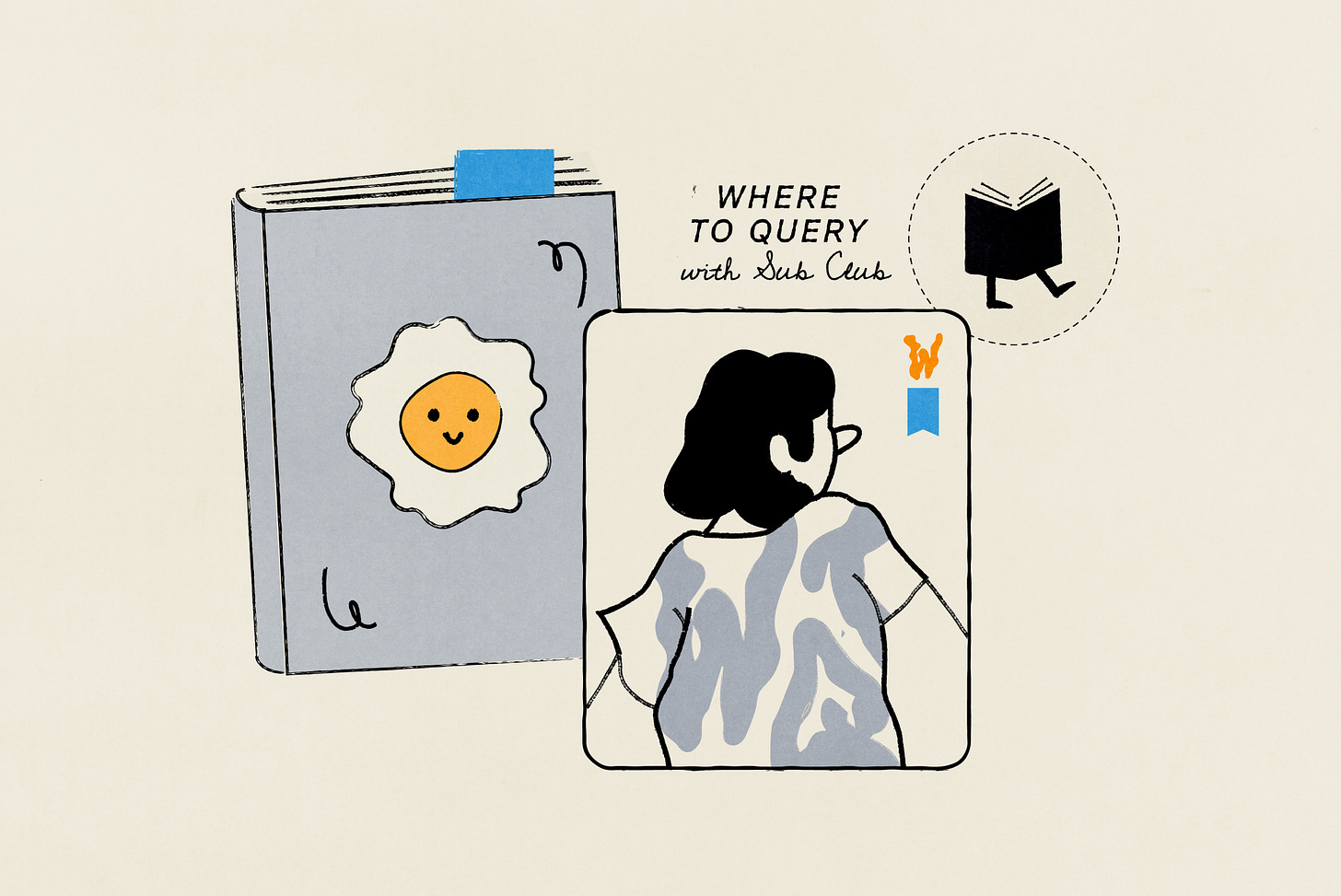12 Agents Looking for Your Coming-of-Age Books
Where to Query This Week (3.26.25) | Plus how to lead with intrigue not themes in your query letter
Welcome to Sub Club’s Where to Query This Week!
I’m very excited to welcome
of to the column! Cassie is a wealth of knowledge when it comes to all things querying, book publicity, and marketing. Her newsletter is one of my personal favorite resources for DIY publishing advice. She often reminds me that in the midst of the chaos and confusion of trying to get a book out into the world, this can all still be fun!Today, she is sharing some actionable advice on how to make your query letter stop agents in their tracks. Read below to learn how to draw readers in right away instead of overwhelming them with themes.
Lead with Intrigue: Rethinking the Query Opening
Every time I read a query, the opening paragraph ends with a list of big, overarching themes. And I want to convince you, nay, challenge you, to lead with intrigue instead.
The theme sentence is usually some variation of:
A memoir of the complications of love.
A generational saga of love, loss, and life at sea. (Okay, life at sea is intriguing.)
A literary novel about grief, vulnerability, and untangling the past.
A story collection about what it means to find home.
While these are all fine “about” sentences and introduce the most basic, general, thematic ideas of the book, they do nothing to convince someone to keep reading. They are not sensual. They are not intimate. They lead to no hook. They give no insight into your specific book. They have no visceral body, only theory.
One of the easiest ways to pull them apart is to create a list for each.
For grief: where, for who, why, how are they handling it, what kind of grief—pull your hair out grief or cry alone in the bathroom at work grief? This list, which can be as long as you want, will not only give you more specifics, but you can search through it for the DING DING DING STEP RIGHT UP of intrigue—the key thing to push a query toward.
Intrigue gives the agent that initial flame to want to know more. It’s a question rather than a statement or answer. And if you start there, instead of reading your pages looking to say no, the agent will be reading your pages like a scavenger hunt, for an answer to the question or itch you’ve created.
How much more interesting than—A literary novel about grief, vulnerability, and untangling the past—is: A literary novel about the kind of grief that makes one contemplate hacking up the community rose garden. You’ve added insight into the story: setting, characterization, maybe even symbolism. All of this might be silent for you while writing. You might not consciously know you’re using roses as a symbol or gardening as a metaphor, but by the time you write your query, you might know better each of these hidden little nooks and crannies of your manuscript.
The continued problem with the blanket theme sentence at the top is that it also creates a sort of top-down effect in your query. Those generalities at the top will lead you directly into a more general summary. You know, the next 7–10 sentence paragraph about the book (synopsis-ish) which tells the agent about the main character and their conflict, or the main memoir beats and the tension. That summary, based on those overarching themes, will also lack the qualities I mentioned above. It will remain at “the book is about” rather than what’s intriguing about these characters or this situation.
I read a query the other day that was all pretty general: a book about two teenage best friends who separated in adulthood and attempted to understand one another on a trip together after many years away from each other. Then, I got to the author’s bio where they wrote something like, “I’m also working on a literary thriller about a start-up CEO, his trophy wife, and the strange man who comes to live with them when the husband loses his job.” THAT sentence was more intriguing than the entire friendship plot that took up most of the pitch.
So, I asked the writer: what’s the tension in this friendship? Why haven’t the girls seen each other? I see in this summary what connected them as teenagers and why they’re nervous about this trip, but what kept them apart? And, of course, you don’t want to give it all away, but you want to breadcrumb tension and intrigue. Strange man is intriguing. This friendship breakup ten years ago over a simple lie of protection is intriguing. Confusion over an intense moment neither has reconciled, two sides of perception—intriguing! But you have to give the agent that itch.
Remember this: an agent does not yet care about the people in your book or the problems they have. You have spent years writing this, grinding, but this is an agent’s first doorway. What matters is not the grief, the vulnerability, or the complicated love story. It’s the tiny tuning fork of tension coupled with intrigue that makes someone want to know more about this story.
Here’s an example of intrigue from our regular lives and “complicated love.” We read anniversary posts on Instagram all the time: “Even though it’s been a hard year, I love you with all my heart …” and immediately, what do you want to know? Why did they have a hard year? And you spend the next ten minutes trying to decipher based on the hand placement in their photos what happened, conjecture and creating stories in your head. You want an agent to have THAT energy going into your book.
What makes one character more vulnerable than another? Is it a class dynamic? Is it a secret? Is it their mother?
What does this character do with their grief, and who disagrees?
Take your big themes and embody them. Apply character to them. Ask questions about them. Give hints to their power. This intrigue you create by taking those themes and peeling them back to their most human of elements will follow through the query and into your pages. Because you’ve already concocted something: a question, a puzzle, an itch, a hmmmm, rather than a simple “about.”
Cassie Mannes Murray is the founder and director of Pine State Publicity. Before launching a business and becoming a mom, she was a literary agent, and earned her MFA from UNCW in creative nonfiction.
THIS WEEKEND! Writer
got her best bylines by placing essays in popular columns. And now she is hosting a workshop with Write or Die, so you can too! Land Big Bylines by Writing for Columns will be held on this Saturday, March 29, and will provide you with a strategy for pitching and selling columns to top publications, such as The New York Times, Cosmopolitan, and many others. This two-hour workshop will be recorded if you can’t attend live!»» Register here ««
12 Agents Looking for Your Coming-of-Age Books
In this list, you will find a variety of genres that agents are looking for coming-of-age narratives—from Middle Grade to YA to Literary to Book Club.
If you’re currently querying and want a curated list specially made for your manuscript, be sure to check out my Personal Agent List service! I have a few spots left for April!
»» Get your own agent list here ««
This part of the column is for paid subscribers only. Paid subscriptions are the only way we fund this newsletter. We are 100% human-made and paid. So if you have the means, please consider signing up for more content like today’s column.









